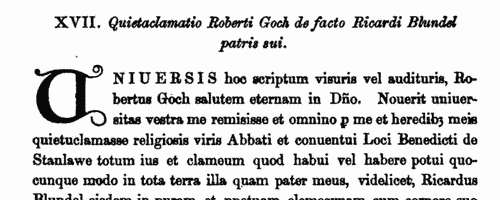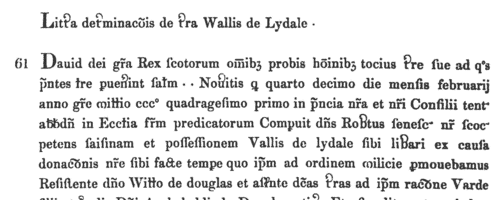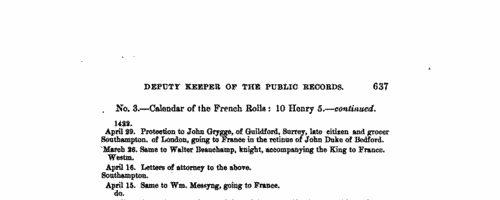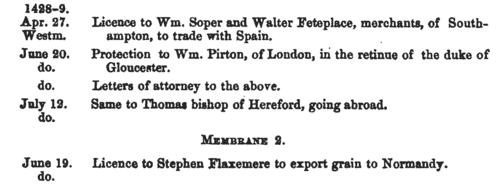Valence Surname Ancestry ResultsOur indexes 1000-1999 include entries for the spelling 'valence'. In the period you have requested, we have the following 49 records (displaying 21 to 30): Single Surname Subscription | | | Buying all 49 results of this search individually would cost £236.00. But you can have free access to all 49 records for a year, to view, to save and print, for £100. Save £136.00. More... |
These sample scans are from the original record. You will get scans of the full pages or articles where the surname you searched for has been found. Your web browser may prevent the sample windows from opening; in this case please change your browser settings to allow pop-up windows from this site. Freemen and citizens of London
(1314-1337)
Letter Book D, or the Liber Rubeus (Red Book) of the City of London contains enrolments of recognizances between inhabitants, particularly citizens, for sums of money lent or due; grants of pieces of land or property; and various records relating to the city administration, minor infractions, &c. In addition, this volume includes the record of admissions to the freedom of the city by redemption (payment of a sum of money), and the binding and discharge of apprenticeships for the same period. Without freedom of the city - which could only be gained by birth (patrimony), apprenticeship or servitude, or by redemption - no man could open a shop, sell goods retail, or even reside within the city walls (except for a limited time, and then only in the houses of freemen and under frankpledge). The text was edited by Reginald R. Sharpe and printed by order of the Corporation of the City of London in 1902.
VALENCE. Cost: £4.00.  | Sample scan, click to enlarge

| Lancashire and Cheshire tenants, patrons and friends of Whalley abbey
(1178-1350)
About to leave for the Holy Land in 1178, John, constable of Chester, founded an abbey at Stanlawe (Stanlow) in Cheshire, endowing it with the townships of Staneye (Stanney) and Aston. Inundated by the sea at Stanlow, the monastery was removed to Whalley in Lancashire in 1294, and this foundation of Cistercians (grey monks) became one of the wealthiest in northern England. It received grants of lands in Ince, Garston, Childewall, Aykebergh, Little Woolton and Warrington in southwest Lancashire; Eccles, Barton, Maunton, Swynton, Pendleton, Worsley, Hulton, Westhalghton, Rumworth, Pendlebury, Cadishead and Denton in the south; Spotland, Chadwick, Castleton, Marland, Todmorden, Rochdale, Whitworth, Heley, Falenge, Chaderton, Wardle, Howarth and Saddleworth in the east; Wytton, Derwent, Plesyngton, Balderston, Salebury, Read, Downham, Clithero, Ribchester, Withnall, Wheelton and Stanworth in Blackburn hundred; and Warton, Carleton, Steyninges, Elswick and Preston in Amounderness hundred; as well as further property in Cheshire, in Chester, Nantwich, Northwich, Aston, Backford, Walton and Wynlaton. A careful copy of all these grants was compiled in the 14th century in what is called the Coucher Book or C(h)artulary of Whalley Abbey. The evidence had been carefully sorted and collated in twenty chapters or titles, each containing a transcript of the grants and evidences relating to a separate parish or township. The people that appear in these deeds are the donors, the witnesses, and occasionally tenants or occupiers of adjoining plots of land. The Coucher Book was edited for the Chetham Society by W. A. Hulton, and published in four volumes, starting in 1847. VALENCE. Cost: £4.00.  | Sample scan, click to enlarge

| Inhabitants of London
(1337-1352)
Letter Book F of the City of London contains enrolments of recognizances between inhabitants, particularly citizens, for sums of money lent or due; grants of pieces of land or property; and various records relating to the city administration, minor infractions, &c. The book includes an assessment of the inhabitants in 1346 (pages 143 to 149) listing many householders; a list of mayors and sheriffs from 1189 to 1548 (276-303), and records of the city's use of infangthef (summary execution of certain criminals) down to 1409. The text was edited by Reginald R. Sharpe and printed by order of the Corporation of the City of London in 1904.
VALENCE. Cost: £4.00.  | Sample scan, click to enlarge

| Testators and legatees in London
(1258-1358)
The mediaeval Court of Husting of the city of London sat (usually on a Monday) each week: among its functions was the enrolment of deeds and wills relating to citizens of London. In their strictest technical sense the terms 'will' and 'devise' are appropriate to real estate, and the terms 'testament', 'bequest' and 'legacy' to personal estate, but this distinction is lost sight of in ordinary usage. This calendar of wills proved and enrolled in the Court of Husting was edited by Reginald R. Sharpe, records clerk in the office of the Town Clerk of the City of London, and printed by order of the corporation in 1889. The date of the court is given in italics, with the year in bold in the margin. The testator's name is given in capitals (surname first, in bold), and then a brief listing of substantial bequests, with the names of legatees, and then the date of making of the will, and reference. Sometimes there were further proceedings in the court relating to the will, such as 'It was found by a jury that the testator was of full age when he made the above testament', a statement as to where the testament had been proved, or proceedings on a challenge to the testament &c. - such additional material is added in a smaller typeface in this edition.VALENCE. Cost: £4.00.  | Sample scan, click to enlarge

| Fine Rolls
(1369-1377)
The fine rolls of the 43rd to 51st years of the reign of king Edward III record part of the government administration in England, with orders sent out day by day to individual officers, and commitment of particular responsibilities and duties. There is also some material relating to Wales, Scotland, Ireland and the English possessions in France. VALENCE. Cost: £4.00.  | Sample scan, click to enlarge

| Fine Rolls
(1377-1383)
The fine rolls of the 1st to 6th years of the reign of king Richard II record part of the government administration in England, with orders sent out day by day to individual officers, and commitment of particular responsibilities and duties. There is also some material relating to Wales, Scotland, Ireland and the English possessions in France. VALENCE. Cost: £4.00.  | Sample scan, click to enlarge

| Inhabitants of London
(1375-1399)
Letter Book H of the City of London contains enrolments of recognizances between inhabitants, particularly citizens, for sums of money lent or due; grants of pieces of land or property; and various records relating to the city administration.
VALENCE. Cost: £4.00.  | Sample scan, click to enlarge

| Douglas family charters
(1150-1400)
The register of the more ancient writs of the Douglases of Dalkeith, Midlothian, Earls of Morton is probably the oldest chartulary of lay possessions in Scotland, and contains about 300 charters. It was edited by C. Innes and published by the Bannatyne Club in 1853 as part II of the Registrum Honoris de Morton. The names that occur are principally those of grantors, grantees and witnesses, mostly from Midlothian.VALENCE. Cost: £4.00.  | Sample scan, click to enlarge

| The English in France
(1419-1420)
King Henry V of England claimed the throne of France (and quartered the fleurs-de-lis of France with the lions of England on the royal standard) as had his predecessors since Edward III, as descendants of Philip IV of France. He married Katherine, youngest daughter of king Charles VI of France in 1420, and thereafter styled himself 'heir and regent of France'. The English had real power or influence in Brittany, Normandy, Flanders and Gascony, and actual possession of several coastal garrisons, in particular Calais, where the French inhabitants had been replaced by English. The English administration kept a series of records called the French Rolls. On these are recorded royal appointments and commissions in France; letters of protection and safe-conduct to soldiers, merchants, diplomats and pilgrims travelling to France from England and returning, and to foreign legations. There are also licences to merchants to export to the Continent, and to captains to transport pilgrims. This calendar of the French Roll for the 7th year of the reign of Henry V (21 March 1419 to 20 March 1420) was prepared by Alexander Charles Ewald and published in 1883. VALENCE. Cost: £6.00.  | Sample scan, click to enlarge

| The English in France
(1425)
King Henry VI of England (one of the grandsons of Charles VI of France) claimed the throne of France (and quartered the fleurs-de-lis of France with the lions of England on the royal standard) as had his predecessors since Edward III, as descendants of Philip IV of France. The English had real power or influence in Brittany, Normandy, Flanders and Gascony, and actual possession of several coastal garrisons, in particular Calais, where the French inhabitants had been replaced by English. Henry VI came to the throne only seven years after his father had trounced the French at Agincourt; but his cousin, Charles VII, who became king of France in the same year, spent his long reign rebutting the English king's claim to his throne by territorial reconquest and consolidation. The English administration kept a series of records called the French Rolls. On these are recorded royal appointments and commissions in France; letters of protection and safe-conduct to soldiers, merchants, diplomats and pilgrims travelling to France from England and returning, and to foreign legations. There are also licences to merchants to export to the Continent, and to captains to transport pilgrims. As Henry VI's reign progressed, and the English grip on northern France loosened, the French Rolls also increasingly include entries concerning the ransoming of English prisoners.VALENCE. Cost: £6.00.  | Sample scan, click to enlarge

|
Research your ancestry, family history, genealogy and one-name study by direct access to original records and archives indexed by surname.
|












